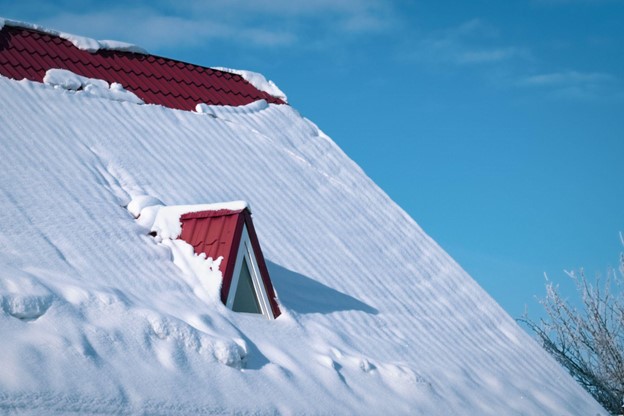
.
Winter can bring about heavy snowfall for homeowners, and it’s essential to ensure your roof is equipped with the strength to support all that extra weight. If you’re considering a metal roof installation for your home, here’s what you need to know.
A metal roof can handle a lot of snow load.
Metal roofs are an excellent choice for areas that receive heavy snow loads because metal is durable and can withstand a lot of weight.
When you think of metal, the first thing that comes to mind is the tin cans used to store food in your pantry. But there’s more to this material than what you find lining your kitchen cabinets! Metal has many forms and applications, including steel (the most common type), aluminum, copper, and zinc alloy metals, all used in roofing applications.
This material has several advantages over traditional materials such as wood shingles or asphalt shingles.
Metal roofs are:
- Fireproof
- Lightweight
- Easy to install without needing special skills or equipment
- Last longer
…and they help prevent water penetration through the roof membrane when appropriately installed with flashing around all openings such as vents or skylights—making them an excellent choice for snowy climates where heavy snowfalls are likely each year!
Metal Roofing Types: How much snow can they handle
Did You Know?
Metal roofs will shed snow sooner than traditional shingles – making them lighter.
Metal roofs also do not require snow rakes as do traditional shingles.
While metal roofs are typically more durable than other types of roofing, they still have their limitations – depending on the type of metal used, so make sure you understand the differences.
Aluminum roofs may be the more economical choice, but their lower PSF rating of 60 won’t stand up well when a heavy snow load is in play. In other words, unless you’re lucky enough to live somewhere with light winter weather, your wallet should prepare itself for some roof damage caused by that extra weight!
A better option would be using a steel alloy classified as “high-strength” (HS). These are most often used for residential applications and can handle about 120 PSF without deforming too much.
Copper alloys also work well because they have high compressive strength but low tensile strength; this means they don’t easily bend or dent when stressed by heavy loads like snow but won’t snap apart as a plastic pipe would under similar circumstances, either!
You should look into what material you’ll use during the planning stages, so you can factor its limits into your design plans before installation begins.
Metal roofs are built to last.
Metal roofs are legendary for their strength and durability! If appropriately maintained, a metal roof can last you decades – so don’t worry about our sweltering summer days or frigid winters. With minimal upkeep, these resilient roofs will easily stand firm against time’s elements.
Metal roofs are sturdy and reliable, especially when supporting heavy snow loads. Because metal roofing is flexible and can be bent to a certain degree without breaking, it can withstand heavy loads of snow without damaging the underlying structure of your home. This makes metal roofs ideal for regions with a lot of snowfall each year.
They also have an impressive lifespan. Metal roofs are built with high-quality materials that last longer than many other types of roofing products on the market today—which means you won’t need to worry about replacing yours anytime soon! Metal roofs come in many colors (including black), so you can customize your home’s aesthetic and durability.
And because metal roofs resist mold growth and retain heat better than asphalt shingles or tiles, they’re more energy efficient, too!
Think about it…
Remember, metal roofs are solid and durable, but like everything else, they’re not indestructible. The material can handle a lot of pressure and weight, but it’s important to remember that metal does have its limits. In most cases, a metal roof can take an average winter storm without issue—as long as you don’t live in an area where snowfall is abnormally high or heavy.
Hopefully, you now better understand how much snow load a metal roof can handle. Remember that the weight of snow depends on many factors, including temperature, humidity, and wind speed.
To find out more important information about metal roofing near you – if you live in Wisconsin, contact us at Swita Metal Roofing to get your questions answered.






